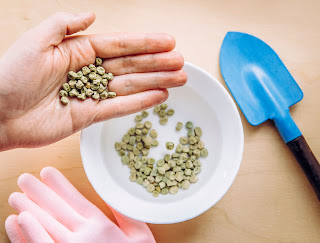Do I need to soak thyme seeds before planting?
Do I need to soak thyme seeds before planting?
1. Transplanting:
If you initially started your thyme seeds indoors or in a seed tray, you can transplant the seedlings into your garden or larger pots once they have a few sets of true leaves.
2. Sunlight:
Thyme requires full sun, so make sure they receive at least 6-8 hours of direct sunlight daily.
3. Well-Draining Soil:
Thyme prefers well-draining soil with good aeration. You can mix in some sand or perlite to improve drainage.
4. Watering:
Water your thyme plants consistently but avoid overwatering, as they don't like to sit in soggy soil. Let the top inch of soil dry out before watering again.
5. Spacing:
Space thyme plants about 12-18 inches apart to allow for proper air circulation.
6. Pruning:
Prune thyme regularly to encourage bushy growth and prevent it from becoming too leggy.
7. Harvesting:
You can start harvesting thyme leaves once the plant is well-established. Use scissors or pinch off the leaves as needed for culinary purposes.
8. Winter Care:
Thyme is a hardy perennial, but in colder climates, it may benefit from a layer of mulch to protect it during the winter months.
With proper care, your thyme plants should thrive and provide you with fresh herbs for cooking and seasoning.Certainly! Here are a few more tips to help you grow healthy thyme plants:
9. Fertilizing:
Thyme is not a heavy feeder, so you don't need to fertilize it excessively. A balanced, slow-release fertilizer applied in the spring should be sufficient. Avoid high-nitrogen fertilizers, as they can lead to excessive leafy growth at the expense of flavor.
10. Pest and Disease Control:
Thyme is relatively resistant to pests and diseases, but you should still keep an eye out for issues like aphids or powdery mildew. If you notice any problems, treat them promptly with appropriate measures, such as insecticidal soap for pests or a fungicide for mildew.
11.Propagating:
Thyme can also be propagated by taking cuttings from established plants. This is a useful method if you want to expand your thyme garden. Simply snip a 4-6 inch stem, remove the lower leaves, and place it in well-draining soil. Keep it moist until roots develop.
12.Variety Selection:
There are various thyme varieties available, each with its own flavor and growth habits. Consider what suits your culinary needs and climate best. Common varieties include English thyme, lemon thyme, and French thyme.
13. Companion Planting:
Thyme can be a beneficial companion plant in your garden. It can help deter certain pests and is known to enhance the flavor of nearby vegetables and herbs.
Remember that thyme is a perennial herb, so it will continue to grow year after year with proper care. Enjoy the fresh flavor it adds to your dishes and the aromatic beauty it brings to your gardenCertainly! Here are a few more tips to help you grow healthy thyme plants:
9. Fertilizing:
Thyme is not a heavy feeder, so you don't need to fertilize it excessively. A balanced, slow-release fertilizer applied in the spring should be sufficient. Avoid high-nitrogen fertilizers, as they can lead to excessive leafy growth at the expense of flavor.
10.Pest and Disease Control:
Thyme is relatively resistant to pests and diseases, but you should still keep an eye out for issues like aphids or powdery mildew. If you notice any problems, treat them promptly with appropriate measures, such as insecticidal soap for pests or a fungicide for mildew.
11.Propagating:
Thyme can also be propagated by taking cuttings from established plants. This is a useful method if you want to expand your thyme garden. Simply snip a 4-6 inch stem, remove the lower leaves, and place it in well-draining soil. Keep it moist until roots develop.
12.Variety Selection:
There are various thyme varieties available, each with its own flavor and growth habits. Consider what suits your culinary needs and climate best. Common varieties include English thyme, lemon thyme, and French thyme.
13.Companion Planting:
Thyme can be a beneficial companion plant in your garden. It can help deter certain pests and is known to enhance the flavor of nearby vegetables In conclusion, growing thyme is a rewarding experience that can enhance your culinary endeavors and garden. To summarize:
conclusion,
growing thyme is a relatively straightforward but rewarding endeavor. By providing the right conditions, including well-draining soil, ample sunlight, and appropriate care, you can cultivate healthy thyme plants that will supply you with fragrant, flavorful leaves for cooking and seasoning. Remember to monitor for pests and diseases, prune as needed, and enjoy the versatility of thyme in your garden and kitchen. Whether you're a seasoned gardener or a beginner, thyme is a delightful herb to have in your repertoire. Happy gardening!



0 Comments